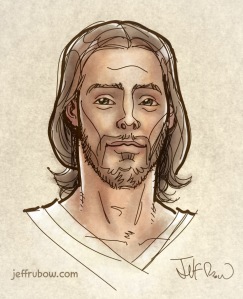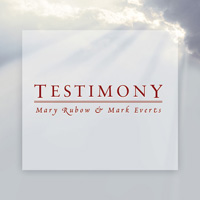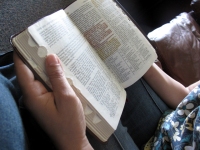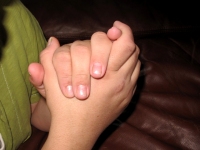At this point in the Bible, a lot of the laws and statutes of God have been given to the Israelites. They have also received instructions on when and how to give sacrifices and offerings to the Lord. These instructions were all given to the people of God, through the mouth of his prophet Moses. The book of Leviticus continues:
1 Likewise this is the law of the trespass offering: it is most holy.
2 In the place where they kill the burnt offering shall they kill the trespass offering: and the blood thereof shall he sprinkle round about upon the altar.
3 And he shall offer of it all the fat thereof; the rump, and the fat that covereth the inwards,
4 And the two kidneys, and the fat that is on them, which is by the flanks, and the caul that is above the liver, with the kidneys, it shall he take away:
5 And the priest shall burn them upon the altar for an offering made by fire unto the Lord: it is a trespass offering.
6 Every male among the priests shall eat thereof: it shall be eaten in the holy place: it is most holy.
7 As the sin offering is, so is the trespass offering: there is one law for them: the priest that maketh atonement therewith shall have it.
8 And the priest that offereth any man’s burnt offering, even the priest shall have to himself the skin of the burnt offering which he hath offered.
9 And all the meat offering that is baken in the oven, and all that is dressed in the fryingpan, and in the pan, shall be the priest’s that offereth it.
10 And every meat offering, mingled with oil, and dry, shall all the sons of Aaron have, one as much as another.
11 And this is the law of the sacrifice of peace offerings, which he shall offer unto the Lord.
12 If he offer it for a thanksgiving, then he shall offer with the sacrifice of thanksgiving unleavened cakes mingled with oil, and unleavened wafers anointed with oil, and cakes mingled with oil, of fine flour, fried.
13 Besides the cakes, he shall offer for his offering leavened bread with the sacrifice of thanksgiving of his peace offerings.
14 And of it he shall offer one out of the whole oblation for an heave offering unto the Lord, and it shall be the priest’s that sprinkleth the blood of the peace offerings.
15 And the flesh of the sacrifice of his peace offerings for thanksgiving shall be eaten the same day that it is offered; he shall not leave any of it until the morning.
16 But if the sacrifice of his offering be a vow, or a voluntary offering, it shall be eaten the same day that he offereth his sacrifice: and on the morrow also the remainder of it shall be eaten:
17 But the remainder of the flesh of the sacrifice on the third day shall be burnt with fire.
18 And if any of the flesh of the sacrifice of his peace offerings be eaten at all on the third day, it shall not be accepted, neither shall it be imputed unto him that offereth it: it shall be an abomination, and the soul that eateth of it shall bear his iniquity.
19 And the flesh that toucheth any unclean thing shall not be eaten; it shall be burnt with fire: and as for the flesh, all that be clean shall eat thereof.
20 But the soul that eateth of the flesh of the sacrifice of peace offerings, that pertain unto the Lord, having his uncleanness upon him, even that soul shall be cut off from his people.
21 Moreover the soul that shall touch any unclean thing, as the uncleanness of man, or any unclean beast, or any abominable unclean thing, and eat of the flesh of the sacrifice of peace offerings, which pertain unto the Lord, even that soul shall be cut off from his people.
The Lord explains or teaches the specifics for the trespass offering, which is a holy offering unto the Lord. After the offering is given, and the parts are burnt on the altar, the priests were to eat it in the holy place of the tabernacle. When a priest took or performed a sin or trespass offering for someone, he was to have it. The money of the offerings and the meat of the offerings went to the priests. The law related to the peace offering of thanksgiving, was that there was also to be offered unleavened cakes as well as leavened bread. Then I think one portion of the sacrifice was to be given as a heave offering. The Lord instructs them that the peace offering was to be eaten that day and no leftovers were to be kept. If, instead, the offering was a peace offering for a vow, they could eat it the same day, as well as the next. However, on the third day, the parts that were left were to be burnt. If this law was not followed, meaning the sacrifice was eaten on the third day, then the entire offering would not be recognized by the Lord. In addition, the one who ate it, would bear the sin from partaking of it. If the offering touched anything considered unclean, was not to be eaten. It was to be burnt. Anything that was clean, was to be eaten. Anyone who ate the offering that was not worthy, because he was unclean or had not kept himself clean through touching anything that was considered unclean, was cut off, or excommunicated, from the people of the Lord.
This same principle applies to the sacrament today. In 3 Nephi 18:29 the Lord taught, “For whoso eateth and drinketh my flesh and blood unworthily eateth and drinketh damnation to his soul; therefore if ye know that a man is unworthy to eat and drink of my flesh and blood ye shall forbid him.” If we partake of it unworthily, we are cut off from the people of the Lord, meaning I think, that we will not be able to be a part of the eternal blessings of the people of the Lord. This does not mean that we have to be perfect to partake, because no one would be able to do so. Partaking of the sacrament is a part of the process of repentance and allows us the opportunity to have our sins forgiven, just as given offerings and sacrifices did for the Israelites. I think that our worthiness comes in the true desire for repentance and forgiveness for the things that we have done wrong, with full intent to turn our hearts more fully to the Lord. When we make partaking of the sacrament, a casual observance, we are no longer worthy of it or the blessings it brings.
22 And the Lord spake unto Moses, saying,
23 Speak unto the children of Israel, saying, Ye shall eat no manner of fat, of ox, or of sheep, or of goat.
24 And the fat of the beast that dieth of itself, and the fat of that which is torn with beasts, may be used in any other use: but ye shall in no wise eat of it.
25 For whosoever eateth the fat of the beast, of which men offer an offering made by fire unto the Lord, even the soul that eateth it shall be cut off from his people.
26 Moreover ye shall eat no manner of blood, whether it be of fowl or of beast, in any of your dwellings.
27 Whatsoever soul it be that eateth any manner of blood, even that soul shall be cut off from his people.
The Israelites were given a strict commandment that they were not to eat fat, but if it was killed by another animal or died on its own, they could use the fat for other purposes. Those who ate the fat of the holy offering, would be cut off. In addition, they were forbidden to eat the blood of any animal. I can understand the reason for commanding them this, because there have been many people through time who have performed sacrifices and then had the blood of that sacrifice. As part of the law of Moses, this was an unrighteous and unholy act.
28 And the Lord spake unto Moses, saying,
29 Speak unto the children of Israel, saying, He that offereth the sacrifice of his peace offerings unto the Lord shall bring his oblation unto the Lord of the sacrifice of his peace offerings.
30 His own hands shall bring the offerings of the Lord made by fire, the fat with the breast, it shall he bring, that the breast may be waved for a wave offering before the Lord.
31 And the priest shall burn the fat upon the altar: but the breast shall be Aaron’s and his sons’.
32 And the right shoulder shall ye give unto the priest for an heave offering of the sacrifices of your peace offerings.
33 He among the sons of Aaron, that offereth the blood of the peace offerings, and the fat, shall have the right shoulder for his part.
34 For the wave breast and the heave shoulder have I taken of the children of Israel from off the sacrifices of their peace offerings, and have given them unto Aaron the priest and unto his sons by a statute for ever from among the children of Israel.
A peace offering was to be given and sacrificed by the hand of the person offering it. A portion of the peace offering was to be a wave offering. The wave offering and heave offerings were the portions given to the priests. Under the word “sacrifices” in the Bible Dictionary, we read, “In the rite of the peace offering, the ceremonies of waving (the breast) and heaving (the shoulder or thigh) should be noticed.” It doesn’t give any additional thoughts on this offering, but when I think of the act of raising a portion of the sacrifice, I think of the Savior being raised both to die for us all, and to save us all. He was raised by those giving Him as a mortal sacrifice and by God in Heaven, who raised Him in glory and exaltation. I don’t know for sure that this was the reason for it, but if all things are meant to cause us to look to Christ, then this is what I think of with these offerings.
35 This is the portion of the anointing of Aaron, and of the anointing of his sons, out of the offerings of the Lord made by fire, in the day when he presented them to minister unto the Lord in the priest’s office;
36 Which the Lord commanded to be given them of the children of Israel, in the day that he anointed them, by a statute for ever throughout their generations.
37 This is the law of the burnt offering, of the meat offering, and of the sin offering, and of the trespass offering, and of the consecrations, and of the sacrifice of the peace offerings;
38 Which the Lord commanded Moses in mount Sinai, in the day that he commanded the children of Israel to offer their oblations unto the Lord, in the wilderness of Sinai.
This wraps us the commandments and instructions regarding these things. Although this is not the last to read in the scriptures on the offerings and sacrifices. They Israelites were to worship the Lord by offering of themselves and these sacrifices: the priesthood anointing, the offerings of the priests, the burnt offerings, meat offerings, sin offerings, trespass offerings, consecrations, and peace offerings. The header for this chapter says, “Through sacrifice they gain forgiveness, make vows, consecrate their property, render thanks, and are reconciled to God.” These things were necessary to receive salvation. All of these things were given to Moses while he was in the mount, while the Israelites were encamped around Mount Sinai.

I was pondering on why so many strict instructions were given regarding the sacrifice to be given. In life there are many paths we can take and many ways to accomplish things, but we only have one path that will lead us to eternal life. This path is the path the Savior has laid for us and any deviation from it leads us elsewhere. I think one reason for these strict instructions, which only allowed for a single specific way to give each offering, was to show us that there is only one way to gain perfect exaltation. The sacrifice of the Savior was on that path. The way in which He was sacrificed, was the way it had to be done to mark the path. When the Israelites followed this instruction with exactness, their sacrifices were accepted by God. Likewise, because the Savior followed the laws of God with exactness, even in His death, it was accepted completely by Heavenly Father and made the pathway perfect and whole. Likewise, we have been shown by the life and ministry of the Savior, the pathway we must take in order to receive exaltation. We must follow Him. He is the way.






Who’s picture is that? god His commandments are clear that no pictures may be made of the Creator God. The drawing also looks a lot similar of presentation of Jesus, who is not God but the son of God.
This is a drawing of Jesus, who is the Son of God the Father. I believe that He is also the God of the Old Testament and God to us today. The Savior said, “Jesus said unto them, Verily, verily, I say unto you, Before Abraham was, I am.” (John 8:58) In Doctrine & Covenants 10:57, which is a revelation from the Lord to the modern prophet Joseph Smith, we read, “Behold, I am Jesus Christ, the Son of God. I came unto mine own, and mine own received me not.” Then later in that same section, we read, “And now, remember the words of him who is the life and light of the world, your Redeemer, your Lord and your God. Amen.” (D&C 10:70)
I feel differently regarding the pictures of God and would be interested to know where your references are on that. I know that we are not to make graven images to worship, because that is not worshipping God, but rather worshipping a work of man. However, I do not believe that a beautiful depiction of God the Father or of His Son, created for the purpose of edifying or drawing us closer to Him, is against any commandments of God.